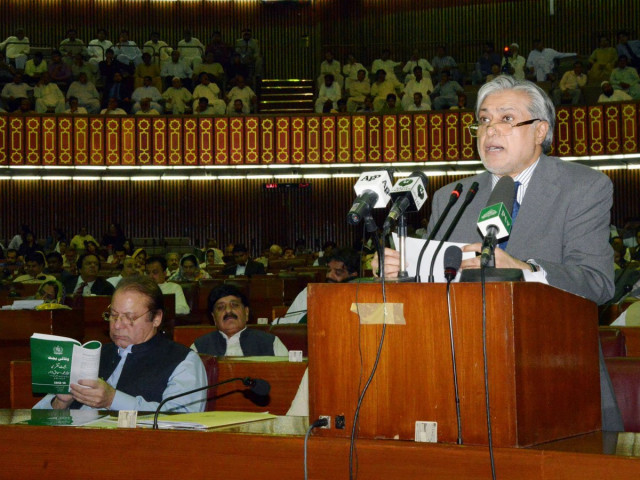Brainstorming: Senate rolls out budget recommendations
Its proposals are not binding upon the National Assembly though.

A file photo of Ishaq Dar. PHOTO: AFP
The upper house has prepared 113 recommendations for the Finance Bill 2013-2014 which is likely to sail through the lower house on Saturday once the ruling party’s proposed budget has been tweaked enough to win majority votes.
Both houses have been brainstorming the federal budget since June 15 following its unveiling by Finance Minister Ishaq Dar on June 12.
However, the Senate recommendations are not binding upon the National Assembly, which held a separate session to discuss the budget on Friday.

The federal budget is being debated since almost a week in the lower house with opposition leaders berating the ruling party for the proposed increase in general sales tax (GST) rate, waiver of customs duty on hybrid cars, taxing of educational institutes and dropping Benazir Bhutto’s name from income support programme.
Some of the Senate recommendations, such as those of abolishing the General Sales Tax and the tax on educational institutes, are in agreement with the opposition’s stance towards the ruling party’s proposals in the lower house.
Chairperson Standing Committee on Finance Nasreen Jalil laid the report containing the recommendations which were approved by the house. “The budget is against the expectations and welfare of people,” she said.

Recommendations
The key budgetary recommendations by the upper house of the Parliament are to withdraw the one per cent General Sales Tax (GST) from the Money Bill, which is being heavily censured by opposition leaders in the National Assembly.
Senators contended that the one per cent rise in GST will push up the cost of necessities by influencing the prices of food items through an inflationary effect.
However, while addressing the lower house on Friday, Ishaq Dar defended the increase in GST and said that implementing the tax proposal from June 13 was a legal step.
The upper house also recommended that the government take back a proposal to impose an advanced tax on educational institutions.
Allowing the Federal Board of Revenue to access all bank accounts in Pakistan is too intrusive, against the privacy of individuals and is prone to abuse and misuse since the board itself is susceptible to corruption, maintained the Senate.
It was also unanimously recommended by the house that the government should allocate a special fund for victims of drone strikes in the budget. Similarly, a special fund should be planned for families of journalists who had lost their lives in the line of duty, were injured in blasts, or paralysed for life while performing their duties.
Furthermore, the Senate recommended to the National Assembly that given the security threat posed by US-led cyber spying, money should be allocated in the budget for a cyber security strategy.
The house proposed that special funds be allocated to waive off educational fee of students belonging to tribal areas, and a quota be allocated in various universities and medical colleges for students of these areas.
The Senate recommended to the National Assembly that the share of Balochistan province in the Public Sector Development Programme 2013-14 should be increased.
Lashing out
Pakistan Peoples Party leader Senator Raza Rabbani on Friday lambasted the interior minister over his statement in which he had given ultimatum to the Sindh government to end crimes in the province within a month. He said that it was sheer interference in the provincial affairs and violation of the constitution.
“Giving ultimatum to an elected provincial government was not appropriate; the minister should come to the House and clarify his statement,” demanded the senator on a point of order.
Published in The Express Tribune, June 22nd, 2013.



















COMMENTS
Comments are moderated and generally will be posted if they are on-topic and not abusive.
For more information, please see our Comments FAQ